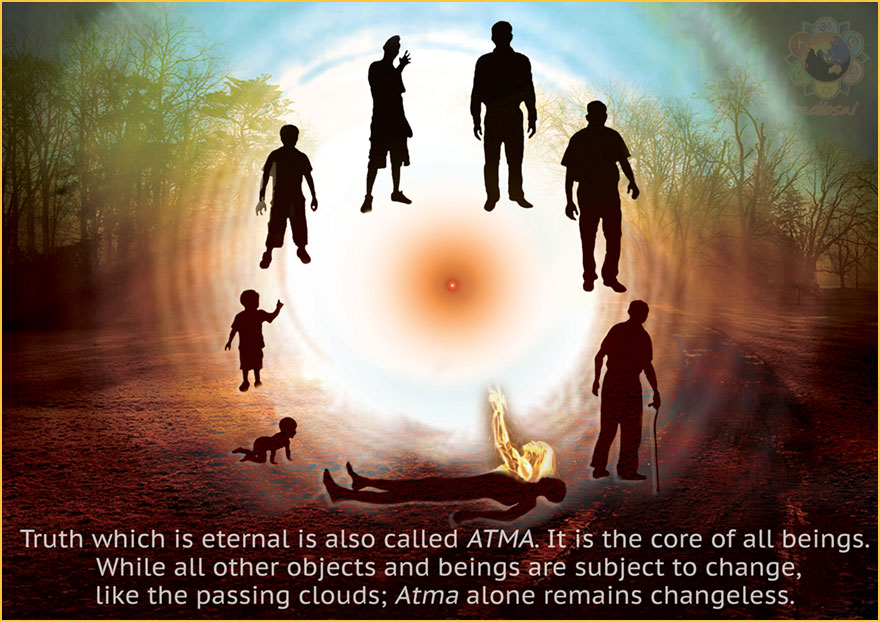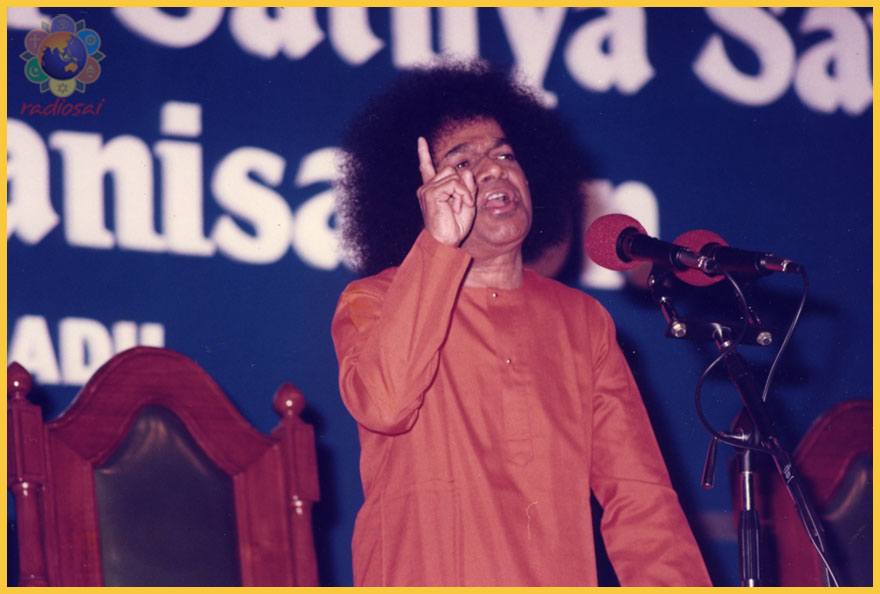|
|
| 'Like' us on Facebook | Follow us: |
Posted on: June 19, 2016
 |
Guru Poornima Special Offering
(Daily Episode)
Part - 11
In 2006, eager to start a service which will help everyone to connect with Bhagawan's teachings on a daily basis, Radio Sai began 'Sai Inspires'. All who subscribed to this service, received an email from us which had a concise message of Baba accompanied with His image. This daily offering was received well, and soon the subscriptions grew. Today nearly 100,000 people from all corners of the world wait for this message to help them tide over their day with peace and ease. The power inherent in these discourse capsules is indeed tremendous. How much we benefit from it and how best we harness this energy depends purely on how seriously we ruminate over these words and how sincerely we put our learning into action. To help us in this noble and elevating exercise, Prof. G. Venkataraman has taken time out to elaborate on these messages. His reflections will not only give us a deeper understanding into what the Lord is communicating to us but also give us tips to translate them into our daily practical life with more ease.
The best way to value the Master is to master His values. As we prepare to celebrate Guru Poornima (July 19), when we pay our respects and obeisance to the Divine Master, let us work to offer Him the tribute that the Lord loves the most from us - to make our lives His message, to make His love and wisdom shine in us. To aid us in this endeavour we have this series where Prof. Venkataraman for the next 26 days from June 9, 2016 shares his insights on select Sai Inspires messages. We hope this will help us to understand His teachings better and bolster our determination to walk on the sacred path.
Sai Inspires Message
THE PURPOSE OF LIFE AND THE IMPORTANCE OF PURITY OF THOUGHT, WORD AND DEED, IN THIS CONTEXT
Pleasures which are experienced with a sense of detachment cease to be bhogas (enjoyment of material comforts) and become a form of Yoga. After enjoying all the pleasures and comforts we seek, what is it that remains? The body decomposes into five elements. What is basic is the Atma principle that sustains the body and all the senses. When the Atma leaves the body, neither the sense organs nor the mind can function. The Atma is Eternal and Omnipresent. It is self-existent. The spiritual quest is to understand and realize the nature of the Atma. Every individual should regard the enquiry into nature of the Atma as the primary purpose of life. Purity of thought, word and deed is essential for this enquiry.
Divine Discourse, January 20, 1985.
REFLECTIONS
Sai Ram. The above quote is not easy to understand without appropriate background explanation, which is what I now wish to offer, especially because this particular teaching of Swami is so important.
We start with the fact that all of us without exception are, in truth, an amazing mix of three distinct entities namely, the gross body, the subtle Mind and the Causal Atma; of these, it is the Atma which is the core of our personality. Swami has reminded of this any number of times, adding that although our actions tend to be driven largely by bodily instincts and mental dispositions, it is really the Atma within which should be the primary driving force. In simple translation, that means the MOTIVATION for all our actions on all occasions no matter what, must come from the Atma; however, that is not the way things happen and that also is where all problems lie.
The question now arises: “Why should the Atma be the source of motivation for all our actions?” The answer to that has been beautifully explained by Swami in the quote we are currently discussing. To understand what Swami is saying, let us ask what happens when a person dies. We know the vital functions cease and the body becomes inert. Not being of any further use, it is simply disposed off. OK, that is what happens to the body. What about the other two components, namely, the subtle Mind and the Atma?
Basically, there are two options which are as follows:
The subtle Mind combines with the Causal Atma, and this combination together floats away to seek another body to embed in and start a new life. This is the process of rebirth.
The Mind simply disappears, leaving the Atma completely ‘free’. To complete the story, the so-called freed Atma ‘reunites’ with the all-pervading Atma, rather like the air in a balloon merging with the air around when the balloon bursts.
 |
Let us look a bit deeper into the two options mentioned above. Option 1, as already mentioned, results in rebirth, that is to say, the Eternal Atma in combination with good old Mind derived from an earlier birth, has a go at life functioning in a new body and as a new person. OK, but if that be the case, when does case 2 operate, if at all? Now that is what may be called a good question. And the answer is, if during the life one has, one makes an active effort to realize that one is neither the body nor the Mind but the Atma, then at the time of death the Mind disappears, following which the Atma within merges with the Universal Atma, rather like the wave disappearing into the ocean and the air in the balloon mixing with the free atmosphere. This is what is usually called liberation or Moksha.
Putting all of the above together, we now get the following guideline given to us by both Krishna [in the Gita that is] and Swami in numerous Discourses. In simple language, the essence of this message can be paraphrased as follows:
O man! Do you know what the purpose of life is? It is to live life in such a manner so that when the body is gone, you merge with the Eternal and Omnipresent God. In practical terms, it means you must lead a life such that your life reflects the nature of the Atma within.
This is where the point about motivation for action made earlier becomes important. If this motivation comes from the Atma, then there would no trace of selfishness; there would be only Pure Love and Compassion. Going back to the Divine, let us see what it has to say concerning this aspect. It says:
O man! While you live, most of your actions are motivated entirely by worldly considerations. As a result, all of them tend to be tainted with selfishness, to say the least. However, if you are focused all the time on Atma, the motivations would then themselves come from the Atma. As a result, the feeling emerging from your Heart would be Pure, the thoughts these feelings trigger in your Mind would be Pure; as a result, the words you speak and the actions you perform would also be Pure. When such Purity becomes the very breath of your life, it is inevitable that when death occurs, your intrinsic nature would reunite with its infinite aspect, rather like the water in an individual wave merging into the ocean from which it was born.
In principle, this advice is not too difficult to follow but in the mind of the keen seeker, a certain doubt is bound to occur, which may be stated as follows: “Suppose a person is born in a royal family and becomes a king. He would have to live like a king amidst luxuries; surely that would be detrimental to his seeking to be his true nature which is the Atma. What should one do under the circumstances?” The answer to that is given at the very beginning of the quote.
 |
Pleasures which are experienced with a sense of detachment cease to be bhogas (enjoyment of material comforts) and become a form of Yoga.
The key word here is detachment. One can adorn the trappings of office but must not become either attached to them or have craving for them. King Janaka is often held as an exemplar of such an attitude. As a working king, he wore a crown, sat on a throne, and conducted the business of ruling. But his mind was far from power and pelf, being focused on the Atma. In such a case, the Mind remains pure, helps the individual to realize his/her true nature as the Atma, and merge with the Atma when the body is shed.
One may say this is not easy. Yes, it is by no means easy; on the contrary, as Lord Acton famously said, “Power corrupts and absolute power corrupts absolutely.” And yet, people of strong willpower have not allowed that to happen. There is the classic example of Harry Truman who succeeded Roosevelt in the middle of the World War II as the President of America. He had to take many a tough decision like dropping the atom bombs, and firing Gen. MacArthur for insubordination at a time when the prestige of the General was much higher than that of the President himself. In other words, Truman really was a powerful man.
Yet, when he relinquished his presidency in 1952, he simply got into his car with his wife and drove all the way back to his home town in Missouri. No driver, no secret service and not even a driver. He stopped and filled gas himself and stayed in inexpensive hotels on the way. That is what is meant by being detached from the trappings of office. It can be done, but it needs strong will power. To say it is not possible, is 1) a sign of moral weakness, and 2) an indication that one loves trappings more than one loves God, who is none other than the Atma.
Think about it!
Radio Sai Team
| comments powered by Disqus |






